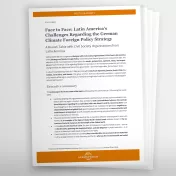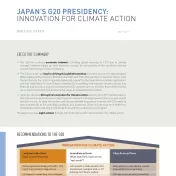
One of the most prominent projects launched by Germany during its G7 presidency has been the initiation of an international “climate club”. Germany decided to use its influence as the president of the G7 presidency to create an open, inclusive, and ambitious climate alliance.
The push for an international climate alliance has come at the right time. A properly designed climate alliance can make an important contribution to global emissions reduction and climate justice. It has the potential to accelerate industrial transformation around the world while creating conditions for fair competition.
But the existence of a climate alliance also brings with it serious risks, and in the worst case—if it is seen as an exclusive project of the West or if it keeps out important states because of a focus on carbon prices—it can have the opposite of its intended effect. In this policy brief, we describe several features that we believe such an alliance must have to avoid such risks and ensure its success.
Summary
The German federal government should push for a climate alliance that
- is open and inclusive;
- offers extensive support for poorer nations and clear perspectives for potential members;
- incentivises countries to increase their national climate targets so as to reap the benefits of membership;
- uses the compatibility of a country’s climate targets with the Paris Agreement as a prerequisite for membership instead of requiring members to adopt a minimum carbon price; and
- harmonises future carbon border adjustment systems while integrating the EU’s existing carbon mechanism.




